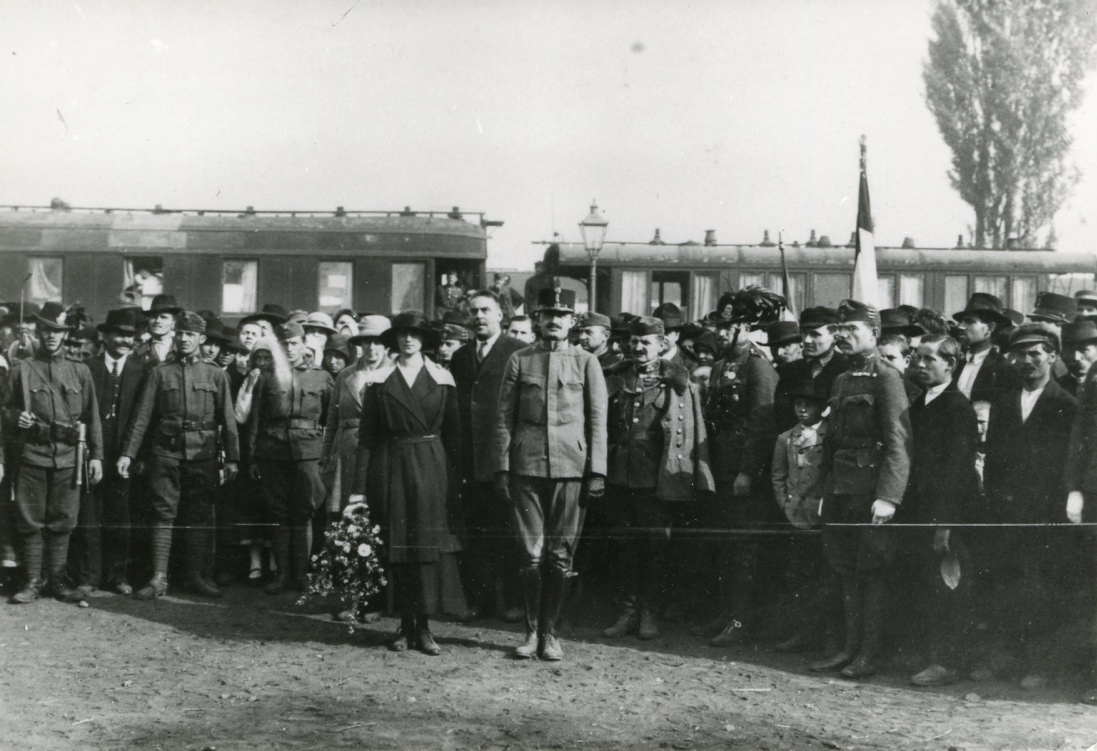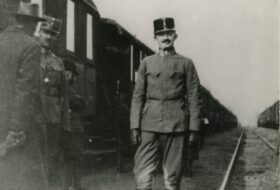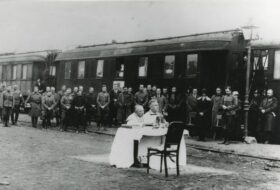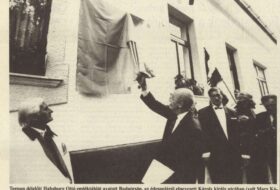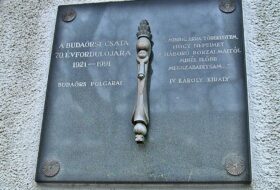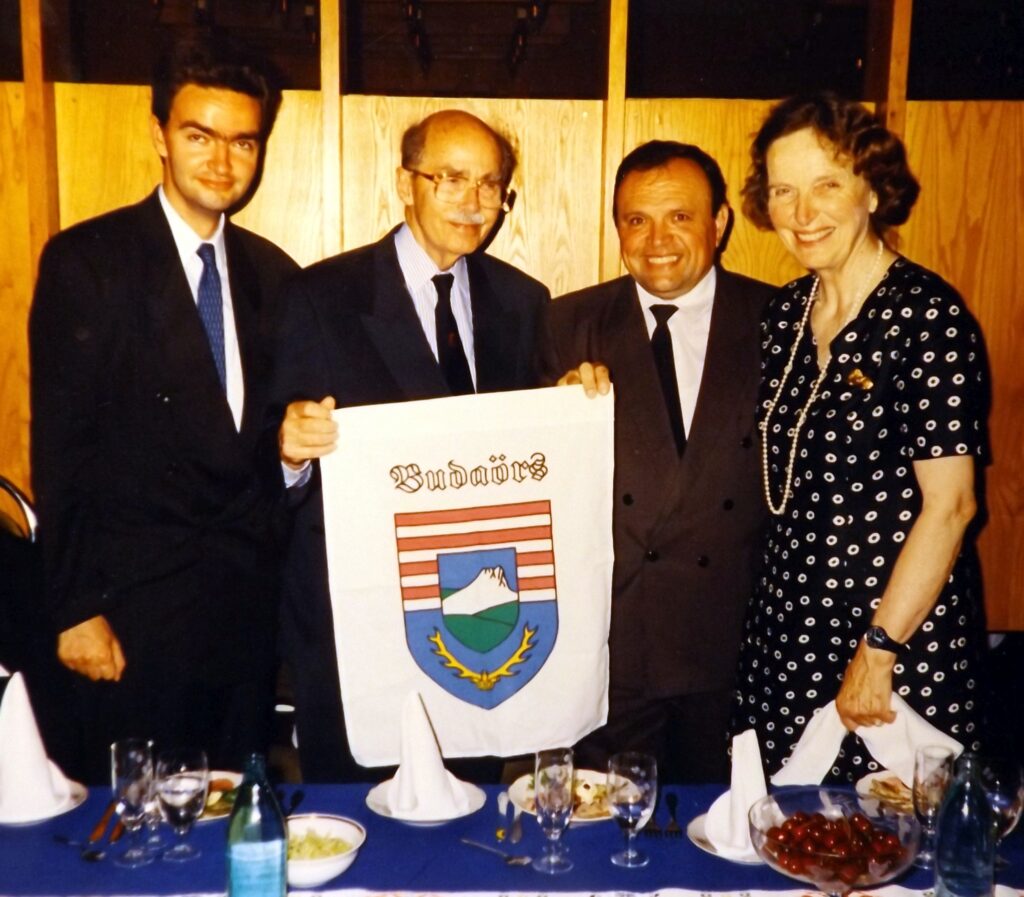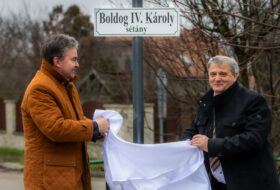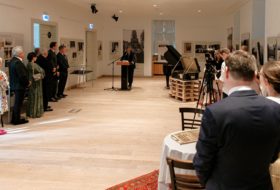The armed skirmish not only thwarted the takeover plan of King Charles IV, who returned to Hungary for the second time a few days earlier on an adventurous journey, but was also a defining event for his country and for his son, Otto von Habsburg, who was only nine years old and was in Switzerland at the time of the battle of Budaörs. 70 years later the former Crown Prince was able to express his thoughts on his father’s second attempt to return in person on the same spot. In 1991 he gladly undertook to take part in the renaming of Karl Marx Street to King Charles Street and in the inauguration of a memorial plaque in Budaörs. He found the name change particularly symbolic.
When we remember this double anniversary, it is perhaps not useless to recall that Charles IV himself was not present in Budaörs at the time of the conflict – the royal couple departing from Sopron only reached the Biatorbágy station. Here they waited for the news and for the formations in and around the capital to line up behind Charles. However, as is well known, this did not happen. Moreover, the path of the safety train in front of the train carrying the couple was blocked in the western part of Budaörs by a derailed locomotive. Besides the force demonstration Charles IV did not want military intervention, so when the skirmish evolved into more serious clashes claiming dozens of deaths at dawn on October 23, he asked for Mass at the Biatorbágy railway station for the spiritual salvation of the dead. Shortly after the surrounding of the forces loyal to him, he backed away to Bicske and then to Tata. He did not want bloodshed but hoped for a diplomatic solution. However, instead of conciliation, he was taken prisoner. Charles IV was transported from Tata to Tihany on October 26, and five days later – through Baja, on a long boat trip – he was exiled to the island of Madeira, where he died six months later.
Otto von Habsburg, who was in Switzerland at the time of the clashes, knew nothing about the events. In November, however, news of what had happened went on and the children were also forced to move. The young archduke, who grasped the weight of the failure of his father, was extremely shaken by the events. In addition, barely six months later, the then 10-year-old boy was also entrusted with the responsibility of Crown Prince.
Throughout his life, Otto von Habsburg remembered with pain the event that took place near Budapest in October 1921, and 70 years later, when he accepted the invitation of the mayor of Budaörs, Tamás Wittinghof, he considered it important to share his thoughts on the issue in a country which was at the time under regime-change. He was present at the event as a Member of the European Parliament and President of the Pan-European Movement. On October 16, 1991, after taking part in the foundation stone laying ceremony of the then-planned shopping centre in Budaörs, he gave a speech on the street renamed after his father and at the inauguration of the memorial plaque (placed on the wall of the Archaeological Museum) created by Tibor Servátius.
His speech was the following:
“There is deep pessimism in the broad sections of the population of our country. Our compatriots believe that things are not moving fast enough and we are not able to solve our problems. Today, as a Hungarian living abroad, I am the only Hungarian Member of the European Parliament who holds a Bavarian mandate in my capacity as a German citizen, but I also try to represent Central European interests as a Hungarian and Austrian citizen. Therefore, I can only come to our country from time to time and so I can see what is happening in a bigger perspective. I can say honestly and from the bottom of my heart: we are doing well. Hard days are yet to come. But even if only step by step, we are still going in the right direction and it seems that with the help of our friends and above all by mobilizing our own strength, we will achieve our goals.
It is an encouraging sign that the interest in our national past is growing in many villages in Hungary. After decades of oppression, we are looking for our roots again. This historical interest, which our -thank God! – replaced tyrants wanted to eradicate, shows that the national feeling has remained and we are fundamentally proud to be Hungarians. This fact has a strong political impact. For they who do not know where they come from cannot know where they are going, because they do not know where they are. Knowledge of history, that is, of the past, is a prerequisite for good direction. We can learn from it the ways of doing the right thing, but also what mistakes we should avoid.
History is a great integrating force. There are short-sighted people looking for opposites in the past. However, if one is impartial, one will reconcile oneself with the past and also with those whom he once considered opponents.
I was recently in Gödöllő on a beautiful day when we celebrated the retreat of the Russians and there, we also sang the Kossuth-song. After the song was sung, a Reverend came to me and said how surprised he was that I not only knew the lyrics, but also that I sang enthusiastically with them. I replied to him that I always look at the past with a positive eye. Everyone, whether on one front or the other in history, is part of our common heritage. Everyone had a role to play in shaping the tradition of our people. This applies to Kossuth as well as to Széchenyi, Rákóczi, or István Tisza and Ferenc Deák. Thus, I can take part in everything that belongs to our national life with a clear conscience, because we are all on the same common ground.
And we also need this historical integration, because we Hungarians are very alone, while the Germans have relatives, just like the Latin peoples or the Slavs. If Hungarian songs are often very sad, this is also an expression of our abandonment. I hope, and this is one of the great goals of my European policy, that we will not be left alone, but will finally find brothers and sisters in the European Community.
The village of Budaörs also fits into this great historical process. I would like to mention two highlights here. At that time, before the tragic deportation, most German-speaking Hungarians lived here. They were loyal patriots, but at the same time proudly preserved their German traditions. Since I had a lot to do with the issue of deportation in Washington at the time and did everything I could to frustrate these plans – unfortunately unsuccessfully because the power of Benes and Stalin was too great – I would like to emphasize that the deportation did not meet the will of the Hungarian people. The Hungarians have always been a hospitable people and have been welcoming foreigners since the time of St. Stephen. It is rare for a country to have declared from the outset that the monolingual people are to fall, and St. Stephen emphasized this in the Admonitions written to his son, Prince Imre.
Budaörs is a memorable milestone in our history also because the tragic battle of 1921 marked a sad turn in the life of our nation for seventy years.
The German-speaking population means a lot to us because it points to the historical need for a German connection that runs throughout Hungarian history. At that time, King St. Stephen might not have been able to convert the country to the Christian and Western path if he had not been helped in the battles against Koppány by the Germans, especially the Bavarians, such as the famous Wencer of Wasserburg. The origin of our Christianity is mostly Passau, i.e., Bavaria. Thanks to the priests and monks of Passau, a Hungarian Christian church was established, which is still the backbone of the nation.
German relations became especially important during the Turkish occupation. Based on my historical studies, I dare say that if we did not have a German background then, Hungary would no longer exist today. This area, which extends to the Rhine and even beyond, has made it possible for us to retain at least the western and northern border castles, and even to finally recapture our country. At the same time, we must underline that the Hungarians also played a decisive role in this western region, when opposing Přemyslid king Ottokar II of Bohemia Rudolf I of Germany won the Battle on the Marchfeld at Dürnkrut with Hungarian help. If the Hungarian army had not been on the side of the imperial forces, it would not be known what the fate of the Danube basin, or even the fate of Hungarians, would have been.
Thinking about the recent history, let us not forget that Austria helped the Hungarians a lot after the tragic revolutionary days of 1956. When the communist regime wanted to cut us off from the news of the West, it was Austrian radio and television that kept alive in many people in our country the certainty that democracy would eventually win. The Hungarian refugees were hospitably received by the Austrians, and even when the Russians returned after November 4, 1956, they did everything they could to keep open the window through which we could get at least a little fresh air in the otherwise hopelessly stuffy atmosphere.
Today, Budaörs remembers the day of October 1921, when the fate of our nation turned. A symbolic expression of this is the fact that we are renaming Karl Marx Street to King Charles Street. It is symbolic also because it bore the name of the prophet of the foreign tyrant. This also shows that this is a real Hungarianization, because King Charles was a king of the Hungarian crown.
It is not easy talking about my own father. Decades later, one tries to judge one’s relatives as objectively as possible and tries to avoid the appearance of saying good things about someone because they are close relatives. So, I try to speak as objectively as possible.
My father, King Charles, and this is acknowledged by everyone, was a deeply religious Christian. That is why he was disgusted with the bloodshed, as evidenced by his behaviour here in Budaörs. But even before that, at the historical turn of the First World War, he was the only one who really wanted to make peace when it was still possible. The great French left-wing historian Anatole Francé said of King Charles that he was the only honest man in the First World War.
I myself went through many wars during my long career as a politician and writer. I have to admit, because it is a fact: the more wars I’ve seen and the more warlords I get to know, often in critical situations, the more I respect my father. I dare say that it takes more courage to make peace than to continue war. It is always easy to arouse war enthusiasm in a patriotic atmosphere of struggle. But it is not easy to negotiate during such hours. A peace lover is often described as a coward. It is true that only people who have already given evidence of their courage can make peace. The great hero of France, General de Gaulle, called this “la paix des braves” – the peace of the brave – when he sought to end the Algerian war through negotiations.
If at that time, in the third year of World War I, my newly ascended father had managed to conclude a peace treaty, the world would look different today. Millions would not have fallen and this peace treaty would not have been as destructive as the later Trianon. In fact, my father’s attempts were unsuccessful. But I still dare say that precisely because he was a crowned king who felt responsible for his people and swore allegiance to the nation, he did what his conscience dictated. He was not a man like certain tyrants of our century who, in spite of the heavy war losses, persuaded our nation to continue to fight and thus destroy its homeland. A Christian ruler who is accountable to God cannot continue to fight when he knows he has already lost.
Many people still ask why King Charles came back in 1921. I can answer that. First, he was bound by his coronation oath. He took this oath very seriously and therefore, even when he had no advantage, kept what he had promised to his God and nation. In addition, let us not forget that at that time, after the fall of Béla Kun, unfortunately, white terror reigned in Hungary. Although the cause of this was, to some extent, the terror of the red system, the nation suffered nonetheless: they wanted their king to return and restore the rule of law.
When Antal Sigray asked him on the eve of the battle of Budaörs what his government program was, he replied: “my program is legal certainty and frugality”. If we look at this from the perspective of seventy years, we can rightly ask whether the Hungarian destiny would not have been different if these principles had been accepted. However, this is a barren brain teaser, and I am opposed to looking at history – after the events – from a ‘what if it were’ perspective. We cannot know how things would have turned out. I do not like those who, after some event, replay in the sand the battles they lost. This can amuse old veterans, but it is not serious politics. So, let us accept history as it was and remember someone who was literally a great king, even though he had no success because he took over his job when the situation was already hopeless.
King Charles was a great king because he wanted peace and democracy. Right from the beginning of his reign, he convened the parliament because he wanted to govern constitutionally. On the one hand, this has made it difficult to run the state, but on the other hand, it has laid the foundations for future democracies. He thought socially, loved common people and was aware of their suffering. It was written by several people and I can confirm this from my own memories that he went out to the front in person and was there with his soldiers, whose cruel fate was deeply felt and he knew that their families were also suffering tremendously. His wife helped him a lot in his duties as well. King Charles was close to his people and wanted to do everything in his power to remedy the social troubles of the people. Had he had the opportunity to reign in peace, he would have created a true social kingdom.
He had long-term plans to reorganize the agricultural order, he wanted to carry out a real land reform, which would not have been illegal, but which would have given small farmers their own income, the land would have been cultivated and Hungary would have been a true middle-class country. This would have given a much stronger foundation to all Hungarian governments than an order in which some were too rich and others too poor. This is the tragic fate of the working class until World War II.
His social orientation was based on faith. He knew that as a crowned king he was accountable to God for each of his countrymen. He knew there was an objective but fair judge who would pass judgment on every single act he made. He was prepared for this judgment all his life. He acted in the perspective of the Last Day, that is, before every act he wondered, whether it really corresponded to what the coronation oath and the Holy Crown meant to him.
In this sense, King Charles can be a great role model for us. In his spirit, we can act as law-abiding, democratic, social people today when it comes to rebuilding our country. It is once again quite timely what he said about his program as “legal certainty and frugality”. This internal peace is the precondition for true national unity. I do not want to say that the strife of the parties is barren. But still, whatever their party affiliation, let us consider as a brother or sister one who faithfully serves the country and its people. If we have actual opposites, let us articulate them calmly, but at the same time understand that the other party is also benevolent and try to persuade them to kindly share our perceptions.
I would like to end with one last thought: I said that King Charles was a true Christian. Not only his words but also his deeds prove that he was a believer in God. He was an ecumenist even before ecumenism was talked about.
We are facing a major task of reconstruction in our economy and politics. But more important is the intellectual reconstruction. The last decades have destroyed us spiritually and the materially. The greatest destruction, however, was moral destruction. The great German poet Ernst Jünger wrote: “Demonen bewohnen die verlassenen Altare” – demons inhabit the abandoned altars. This has happened to us in recent decades. Today, demons are by and large absent, the altars are abandoned again. It is our job to repopulate these altars, but in a different spirit: with our faith in God, our love for our country, our national honor, and the social spirit that we need even more today than in the past. Recent developments have brought many benefits. But now let us think not only of the market, but also of the fact that this market is not an aim in itself and has a right only as long as it serves the people, including those who need solidarity most.
In this sense, this celebratory event in Budaörs is a sign that we have a trust in the Hungarian future. Here we stand on historical ground, the scene of a great Hungarian tragedy, with the determination that our actions should never lead to such a tragedy again. In this way we can build the great and beautiful Hungarian homeland for which the last crowned king of the country sacrificed his life.”[1]
After the speech, he visited Bicske, where the bust of Father Miklós Griger a legitimist priest, was erected.
For Otto von Habsburg, the figure of his father served as an example of spiritual renewal after the regime change. He did not contemplate the tragedy of the past, but looked to the future and highlighted the values represented by his father to the Hungarians awakening from the oppression of the communist dictatorship.
Gergely Fejérdy
Translated by Zsófia Erdélyi
[1]A typed version of the text can be found in the Collection of the Otto von Habsburg Foundation, HOAL I-4-b-Budaörs, October 16, 1991 (The archives of the Otto von Habsburg Foundation are under arrangement, therefore the indications given in this article cannot be considered final). The text is in its original form, punctuation and spelling have not been changed.
